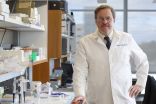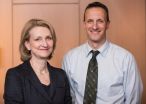(Press-News.org) Patients who relapse in their battle with acute myeloid leukemia (AML) may benefit from a phase three study of therapies that combine an existing agent, cytarabine, with a newer compound, vosaroxin.
The study, led by Farhad Ravandi, M.D, professor of medicine, department of leukemia at The University of Texas MD Anderson Cancer Center, demonstrated increased survival rates, particularly in AML patients over age 60.
Ravandi's study results were presented today at the 56th Annual Meeting of the American Society of Hematology (ASH) annual conference in San Francisco and were published in the ASH journal Blood.
Acute myeloid leukemia is the most common form of adult leukemia. The current accepted treatment, cytarabine, when used with other existing agents such as anthracyclines, is associated with increased toxic side effects.
The 124-site international randomized trial was among the largest of its kind. It demonstrated that combination therapy employing the agent cytarabine with others such as vosaroxin does not cause the significant toxic side effects experienced when cytarabine is used in combination with anthracyclines.
"Currently there are no standard-of-care approved treatments for relapsed or treatment-resistant AML. Effective and safe therapies are critically needed for patients with relapsed or treatment-resistant acute myeloid leukemia" said Ravandi. "These data provide encouraging support that this combination may be an effective new salvage therapy in older patients with this challenging condition."
Toxic side effects from combining cytarabine with anthracyclines or topoisomerase inhibitors can include damage to the heart muscle. By combining cytarabine with new agents, researchers hope to develop an effective treatment for AML that does not cause significant additional toxicity. One such agent is vosaroxin, an agent that can target and evade the cancer cell's natural defenses and help induce cancer cell death. Researchers have investigated this compound in a phase three randomized trial to evaluate its ability to overcome the limitations of current therapies without the cardiotoxicities commonly observed with other treatments.
In the trial, 711 patients with relapsed or hard-to-treat AML at 124 sites worldwide were randomized to receive cytarabine with either vosaroxin or placebo. Patients treated with vosaroxin achieved longer overall survival compared to those treated with placebo (7.5 months versus 6.1 months)and were more likely to achieve complete response or remission to the treatment (30.1% experiencing complete response in the vosaroxin arm versus 16.3% in the placebo arm).
Significantly, patients age 60 or older and those experiencing early relapse experienced the greatest overall survival benefit from the treatment. Early mortality was similar in the two arms, and the most common adverse events were neutropenia or low white blood cell levels, sepsis, and infections as well as mouth sores.
INFORMATION:
Other MD Anderson study investigators included Elias Jabbour, M.D., Jorge Cortes, M.D., and Hagop Kantarjian, M.D, department of leukemia. Other participating institutions included Weill Cornell Medical Center, New York; Indiana University Cancer Center, Indianapolis; Moffitt Cancer Center, University of South Florida, Tampa; West Virginia University, Morgantown; Institut Paoli-Calmettes, Marseille, France; Vanderbilt-Ingram Cancer Center, Nashville, Tenn.; University of California, Los Angeles; University of Alabama, Birmingham; Hôpital Haut Lévêque-CHU de Bordeaux, Pessac Cedex, France; Medizinische Klinik und Poliklinik im Städtischen Krankenhaus, Kiel, German; Hôpital Purpan-Chu de Toulouse, Toulouse, France; Memorial Sloan-Kettering Cancer Center, New York; Sunesis Pharmaceuticals, Inc., South San Francisco, Calif.; Cytel, Inc., and Harvard School of Public Health, Cambridge, Mass.; and Medical University of South Carolina, Charleston.
The study was funded by Sunesis Pharmaceuticals, Inc.
Results from a large, prospective clinical trial add to mounting evidence that adolescent and young adult patients--aged 16 to 39 with acute lymphoblastic leukemia (ALL)--tend to fare better when treated with high-intensity pediatric protocols than previous patients who were treated with standard adult regimens.
The intergroup trial, presented at the 56th annual meeting of the American Society of Hematology, enrolled 296 adolescent and young adult patients with ALL. All participants were treated by adult hematologists-oncologists on a pediatric protocol, including four ...
SAN FRANCISCO (DECEMBER 7, 2014) - Researchers at Dana-Farber/Boston Children's Cancer and Blood Disorders Center report promising outcomes from a clinical trial with patients with a rare form of bone marrow failure who received a hematopoietic stem cell transplant (HSCT) after pre-treatment with immunosuppressive drugs only. This is the first trial reporting successful transplant in dyskeratosis congenita (DC) patients without the use of any radiation or conventional cytotoxic chemotherapy beforehand.
The trial's data were presented by study authors Leslie Lehmann, MD, ...
(SAN FRANCISCO, DECEMBER 7, 2014) - Recognizing that leukemia cannot be conquered with a "one-size-fits-all" approach, researchers are pursuing novel targeted therapies and combinations of existing treatment regimens with new agents for patient populations with historically poor prognoses, according to data presented today during the 56th American Society of Hematology (ASH) Annual Meeting and Exposition.
In recent years, outcomes for patients with leukemia have steadily improved with the emergence of numerous therapies that target specific genetic drivers of disease, ...
SAN FRANCISCO, CA, December 7, 2014--A new type of cancer therapy that targets an oncometabolite produced dramatic results in patients with advanced leukemia in an early-phase clinical trial. The study, led by Eytan M. Stein, MD, a medical oncologist at Memorial Sloan Kettering Cancer Center, was presented today at the 56th Annual Meeting of the American Society of Hematology.
Approximately 15 percent of acute myeloid leukemia patients have a mutated form of the IDH2 gene. IDH2 normally makes a protein that plays a critical role in cell metabolism. However, when the gene ...
UNSW Australia's solar researchers have converted over 40% of the sunlight hitting a solar system into electricity, the highest efficiency ever reported.
The record efficiency was achieved in outdoor tests in Sydney, before being independently confirmed by the National Renewable Energy Laboratory (NREL) at their outdoor test facility in the United States.
The work was funded by the Australian Renewable Energy Agency (ARENA) and supported by the Australia-US Institute for Advanced Photovoltaics (AUSIAPV).
"This is the highest efficiency ever reported for sunlight conversion ...
The "molecular mail" sent by multiple myeloma cells provides clues to how well patients with the disease are likely to respond to treatment, according to a study being presented at the annual meeting of the American Society of Hematology (ASH) by researchers at Dana-Farber Cancer Institute.
The findings - to be presented in poster form on December 6, from 5:30 PM to 7:30 PM, in the West Building, Level 1 - may ultimately guide doctors in deciding which therapies are best for individual patients with myeloma, the study authors say.
The study focused on ...
An innovative cell therapy against a highly aggressive form of acute lymphoblastic leukemia (ALL) continues to show highly promising results in children treated in a pilot study. Ninety-two percent of the 39 children receiving bioengineered T cells had no evidence of cancer at one month after treatment, with this complete response persisting in some cases for more than two years. The personalized cell therapy reprograms a patient's immune system and offers the potential of long-term success.
"As we continue to follow children in this study, we see exciting results for ...
SAN FRANCISCO - A therapy that liberates the immune system to attack cancer cells drove Hodgkin lymphoma (HL) into complete or partial remission in fully 87 percent of patients with resistant forms of the disease who participated in an early-phase clinical trial, investigators at Dana-Farber Cancer Institute and partnering institutions report in a study published today in the New England Journal of Medicine and simultaneously presented at the annual meeting of the American Society of Hematology (ASH) in San Francisco.
The results provide some of the most dramatic evidence ...
SAN FRANCISCO, CA, December 6, 2014--In recent years, a number of scientific breakthroughs have led to the development of drugs that unleash the power of the immune system to recognize and attack cancer. Studies presented today at the 56th Annual Meeting of the American Society of Hematology (ASH) highlight the enormous potential these novel treatments have for patients with a variety of hematologic disorders.
For Classical Hodgkin lymphoma (cHL) patients, two phase I studies are already demonstrating dramatic results. A study led by Craig H. Moskowitz, MD, Clinical ...
PHOENIX -- In the treatment of multiple myeloma, the addition of carfilzomib to a currently accepted two-drug combination produced significantly better results than using the two drugs alone, according to a worldwide research team led by investigators from Mayo Clinic.
Their findings will be reported online Dec. 6 in the New England Journal of Medicine, and presented on Dec. 7 at the annual meeting of the American Society of Hematology (ASH), held in San Francisco.
Interim analysis of the ASPIRE clinical trial, which enrolled 792 patients with relapsed multiple myeloma ...



